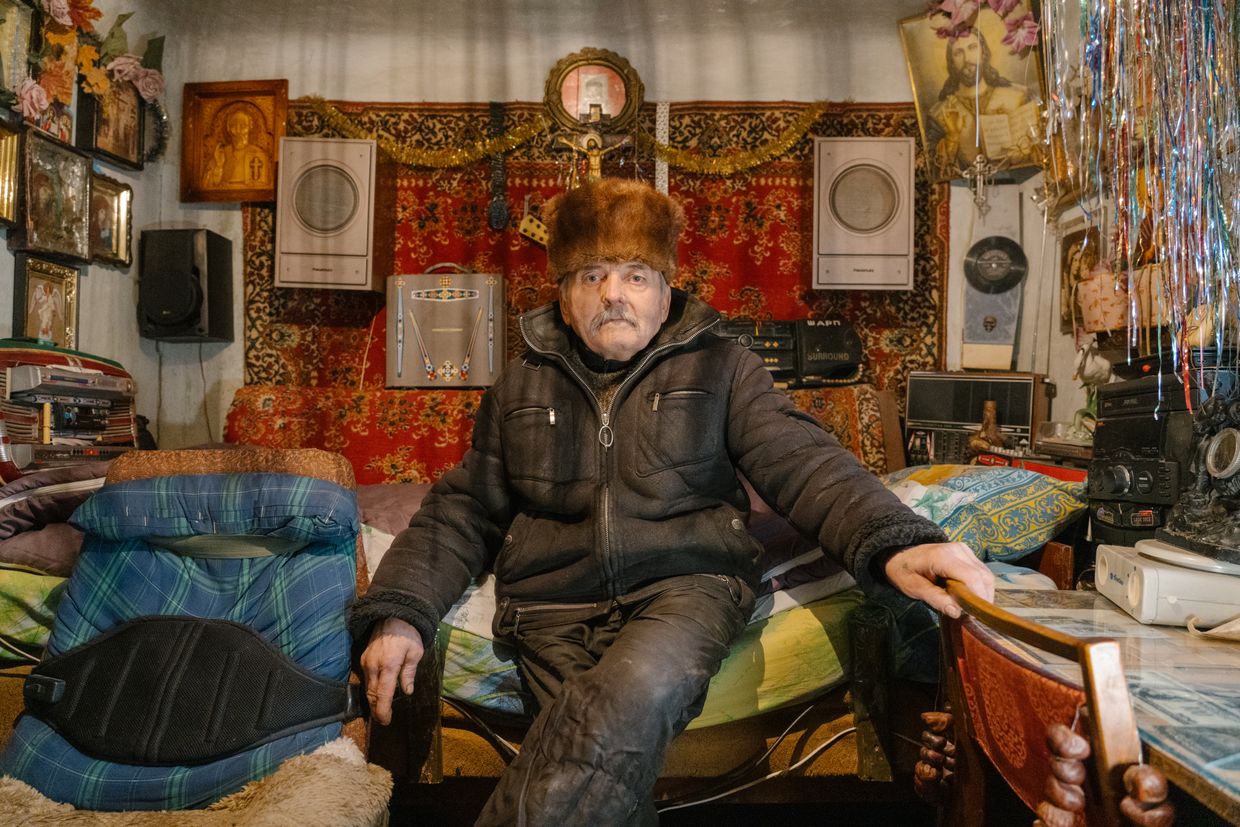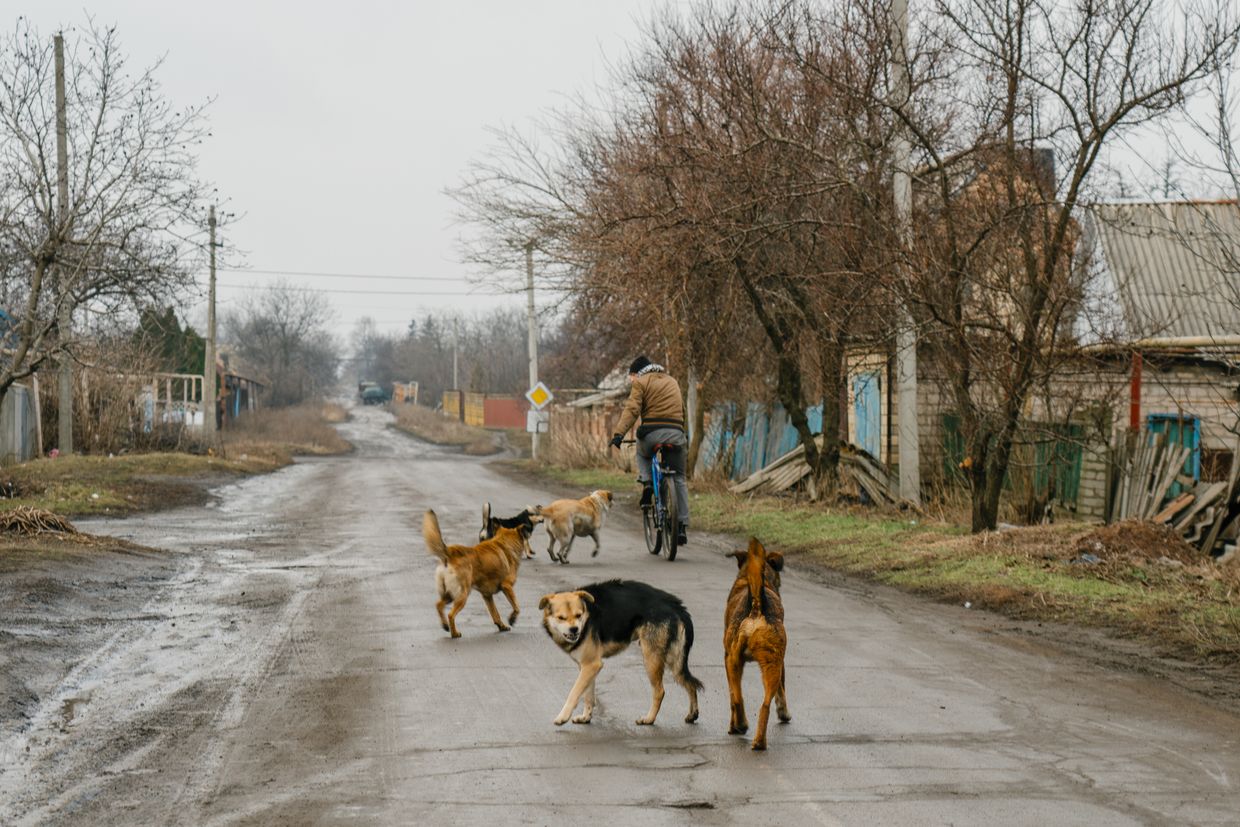Ukraine’s ‘angels’ who look after, evacuate civilians left in front-line Donbas

TORSKE-ZAKINTE, DONETSK OBLAST – An armored minibus speeds through the rubble-lined streets of Torske, a front-line village in Donetsk Oblast precariously close to Russian positions.
The bus, which belongs to the White Angels — a special unit of Ukraine’s National Police — is on its way to the village to deliver aid and check in with the few remaining civilians. Only the hum of the engine dulls the sporadic explosions echoing in the distance.
The White Angels frequently return to the village, now directly in the line of Russia’s offensives following its capture of Avdiivka, to see if anyone left behind has changed their mind about staying.
On this particular day, there are no takers. The White Angel’s crew of two, Valeriia Chernikova and Dmytro Bilenets, stop by several houses to talk to around a dozen locals and give them food and gifts for the upcoming International Women's Day on March 8.
Only a handful of elderly residents remain out of Torske's pre-war population of 700.
Serhii, who declined to disclose his last name, said he relies on his garden harvest and humanitarian aid to sustain his family of three.

After fleeing to Kyiv after the start of the full-scale invasion, his family returned after they found it hard to find jobs.
"What we lack most is peace... and electricity," Serhii told the Kyiv Independent.
Several streets away, a heavily damaged house sits quietly beside a skeleton of what used to be a workshop. A sign that reads only part of the street name clings to a rusty, pock-marked fence.
The couple is already waiting for the White Angel squad outside. Olena and Ivan have been living in Torske for over 25 years and say they will only leave with their cows and goats.
"It would be a pity to leave everything (behind). It's damaged but it's ours," Olena told the Kyiv Independent.


Five White Angel teams made up of local police with good knowledge of the terrain go back and forth to the red zones — high-risk areas — to deliver aid, treat the wounded after Russian attacks, and evacuate the dead and living.
The White Angels have already evacuated over 6,500 people, including 724 children, from the front-line areas of Donetsk Oblast since its creation in December 2022.
Russian officials and propaganda outlets drag their name through the mud, portraying the unit as engaged in human trafficking, forcibly separating children from their parents.
"These are professional child abductors who are assisted by the police... Ukrainian children are victims of slave traders from the U.K. and the U.S., assisted by the special services," Anna Kuznetsova, deputy speaker of the Russian parliament, claimed in the summer of 2023.
Chernikova, a paramedic serving with the White Angel since day one, refutes these allegations as "ridiculous." She has evacuated over 100 adults and 40 children from front-line villages in the Lyman direction.
"You will become our accomplice during tomorrow’s evacuation. You will abduct a man with us," Chernikova quipped to the Kyiv Independent on the way from Lyman to Torske in reference to the Russian propaganda claims.

Evacuation
The next morning, the white minibus sets off heading southeast from Lyman for the evacuation mission. Serhii Neklesa, a civilian, requested the local authorities to evacuate him from Zakitne the day before.
The village sits six miles east of the Serebryanskyi forest on the border between Donetsk and Luhansk oblasts.
Russian forces are hell-bent on seizing control of the Serebryansky forest, viewed as the gate to Lyman, an important but destroyed train hub. Ukraine liberated Lyman the next day after Russia annexed it with four Ukrainian regions in 2022.
In the rear of the minibus, where there were boxes of humanitarian aid the day before, now sit two benches, first aid kits, water, and other essentials.
Roughly 30 minutes later, the bus stops near the gates of a red-brick house with boarded-up windows. Chernikova waits for Neklesa to come out as Bilenets keeps the engine running.
A small black dog starts barking while Neklesa slowly boards the bus with a flat-screen TV covered with a blanket and two plastic bags filled with documents, a change of clothes, and canned food.

His wife and four children kept persuading Neklesa to leave whenever they talked on the phone when sporadic cell service appeared in the area.
“It’s a pity to leave,” Neklesa told the Kyiv Independent, adding that he built the house together with his father decades ago.
He said six generations of his family lived in Zakitne, lamenting the almost daily Russian attacks that turned the village into ruins.
"There is always hope (for a return). I hope that our (soldiers) will win and liberate Ukraine from the Russians," said Neklesa.
Months ago, his family fled to the western Lviv Oblast after one of his three sons suffered shrapnel wounds to the head and neck in one of Russian attack.
On the way to Lyman, Neklesa winces in pain as the bus jumps a bumpy road. His broken ribs are a painful reminder of how he injured himself while seeking shelter once when Russian forces were shelling Zakitne.

Upon arrival in Lyman, the White Angel's evacuation mission is done after assisting Neklesa in boarding another white vehicle.
The charitable organization Salvation Angels will transport him to Porkrosvk to catch a train and reunite with his family over 600 miles west.
“I will hug and kiss (my loved ones when I get to them),” Neklesa said, holding back tears, and added that he no longer wants to remember the sounds of explosions.
Note from the author:
Hi, this is Alexander Khrebet, the author of this article. When Neklesa's evacuation bus pulled away in Lyman, Dmytro emerged with a bouquet to mark International Women's Day with Valeriia. When back in Kyiv, I found out they are a married couple. Their story of working together to support front-line communities inspired me. To make sure the Kyiv Independent can keep telling these important stories of bravery and resilience, please consider supporting our reporting.












